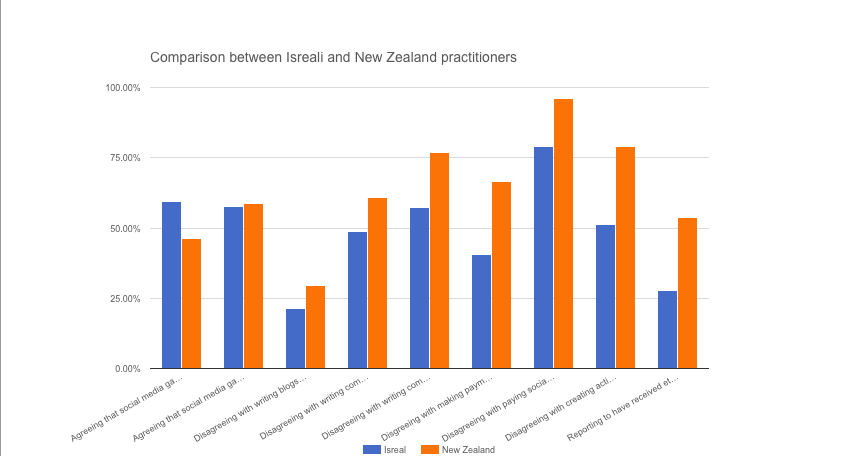Role of Societal Factors
When practicing global public relations, practitioners are advised to pay attention to societal factors including political, cultural, economic and media conditions to understand how the public relations environment differs from each other. In response to calls for more cross-cultural studies in public relations, a survey was administered to compare practitioners’ understanding of ethics on social media in Israel and New Zealand respectively. These findings were made:
- Control over distribution of messages: More practitioners in Israel (59 percent) than New Zealand (46 percent) agreed that social media gave them more control over the distribution of messages.
- Influencing management decisions: Practitioners in both Israel (57 percent) and New Zealand (58 percent) agreed that social media presented public relations with an opportunity to influence management toward making ethical decisions because of public scrutiny.
- Ghost-writing: More practitioners in New Zealand (29 percent) than Israel (21 percent) expressed reservations toward writing blogs on behalf of others.
- Writing fake comments: More practitioners in New Zealand (60 percent) than Israel (48 percent) disagreed with writing comments on social media without disclosing their real identity.
- Disclaimer about sponsor: More New Zealand (76 percent) than Israeli (57 percent) practitioners disagreed with writing comments on social media without a disclaimer about the sponsor.
- Paying bloggers: More practitioners in New Zealand (66 percent) disagreed with making payments to bloggers than Israel (40 percent).
- Paying for negative messages: 96 percent of New Zealand practitioners and 78 percent Israeli practitioners disagreed to paying for social media experts to spread negative messages about a competitor.
- Paying activist groups: 79 percent of New Zealand practitioners disagreed to creating activist groups to support their clients on social media (vs. 51 percent Israeli practitioners).
- Ethical training: Only 27 percent Israeli practitioners reported that they have received ethical training in communication on social media (vs. 53 percent).

The significantly lower scores that Israeli practitioners gave to the ethical statements in the study showed that they had lower levels of knowledge and commitment to ethical practices on social media. It is recommended that international indices be used to identify the similarities and differences in local and universal practices on ethics. The study proposes that in countries which enjoy more freedom, practitioners would be more conscious about ethics and would be less willing to accept unethical practices.
The above study indicates significant differences not only in terms of their approaches to ethical practices in public relations, but also their definitions of public relations (or how they have been going about practicing public relations). To some extent, the ethical standard in global public relations could also be challenged by the problems listed above, such as (a) assuming the utility of a universal standard, (b) disregarding specific societal factors driving the different principles and practices used, and (c) defining ethics as what should be done rather than what is accepted by the global community.
Next Page: Approaches to Conceptualizations of Ethics in a Global Context